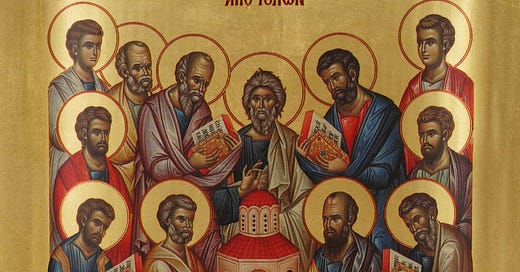Creeds are Sacramental (Not Just Educational)
How the "rule of faith" works to form us as God's people
Several years ago, I read through Ben Myers’ short book The Apostles’ Creed: A Guide to the Ancient Catechism, and found it really helpful in understanding not just what is in the Apostles Creed, but why it exists, and how it works in the life of the church to shape and form us as the Body of Christ.
So today I’m starting a series of reflections on the Apostles’ Creed, using Myers’ book as a lens and launching point.
The Apostles’ Creed
Just so we know what we’re referring to in this series, here’s the text of the Apostles’ Creed:
I believe in God, the Father almighty, creator of heaven and earth;
I believe in Jesus Christ, his only Son, our Lord.
He was conceived by the power of the Holy Spirit
and born of the Virgin Mary.
He suffered under Pontius Pilate,
was crucified, died, and was buried.
He descended to the dead.
On the third day he rose again.
He ascended into heaven,
and is seated at the right hand of the Father.
He will come again to judge the living and the dead.I believe in the Holy Spirit,
the holy catholic Church,
the communion of saints,
the forgiveness of sins,
the resurrection of the body,
and the life everlasting. Amen. Why reflect on the creed?
In the Preface to the book, Myers’ points out that every baptized Christian already possesses the faith in its fullness. We do not start with baptism and then move on to higher mysteries. So the purpose of reflecting on the creed is not to tell anyone what they should believe, but to unfold the fullness of what we already have. “Everything belongs to you,” says Paul (1 Cor 3:21). The inheritance is the same for every baptized Christian.
So why study the creed? Because “the better we grasp [the magnitude of what we’ve received], the happier we are.” So reflecting theologically on the Apostles’ Creed is an invitation to happiness. Thus I hope you’ll join me in increasing our collective joy through these reflections.
The creed’s roots in the “rule of faith”
In the introduction to the book, Myers’ points out that the Apostles’ Creed comes from something called the “rule of faith,” which was a distillation of the gospel as proclaimed by the apostles. This proclamation of good news was the foundation of Christian faith, which is rooted “ultimately in the word of the risen Christ himself.”
Myers says this ancient rule of faith had two functions. First, it was educational. It was the essence of the catechesis given to new Christians. The trinitarian confession of faith was memorized and understood so that it could never be lost or forgotten. This rule of faith was a basic guide for the interpretation of scripture, and thus “even illiterate believers would be able to retain the substance of the biblical story.”
But secondly (and more interestingly to me), the rule of faith was sacramental. This means God was acting in the lives of humans as they confessed the rule of faith. It was not just used as a teaching tool, but was confessed liturgically during the baptismal rite itself, like a pledge of allegiance, like marriage vows. These are words that perform, not just inform. “In baptism, something is brought into being as the words are spoken,” Myers says, “It is the words, just as much as the water, that make a baptism. By these words a person becomes a disciple of Jesus and a member of his community.”
Confessing the creed together
In the Daily Office liturgies of the Episcopal Church, the Apostles’ Creed is confessed twice a day (during Morning Prayer and Evening Prayer). It is also confessed whenever we celebrate baptisms or confirmations. Most Sundays during our Holy Eucharist liturgy we confess the Nicene Creed after hearing scripture read and a sermon preached. Liturgically speaking, these are words that get said a lot in my tradition.
A congregant once told me that he disliked saying the Creed right after the sermon, because it just seemed like a bunch of “boring, old words” right after the new, interesting words of the sermon. This is why I find it helpful to think of reciting the Creed not just as educational or informational, but as sacramental. As we confess our faith together, we aren’t just reciting some facts about God and salvation history. We aren’t consolidating power (as is sometimes said about the purpose of the creeds).1
When we confess the creed together as the church, we are doing something sacramental: participating in the reality we speak of. To say “I believe…” is not so much to confess individual confidence but to confess corporate belonging and participation in the Church of Jesus Christ, across time and space—the communion of saints throughout the world and throughout the ages who belong to Christ and participate in the life of God by the power of the Holy Spirit.
Next in this series: Who is the "I" Who Believes the Creed?
I do understand this assertion, though, because there were all kinds of political and power interests at play in the formation of the Nicene Creed, for example. But I don’t think this makes the creeds inherently instruments of exclusion and power-hoarding, because God has been working through the very imperfect human beings who make up the church since the very beginning.






Guess what book our staff team is beginning to read *this week* to prepare for our summer sermon series on "The Apostle's Creed" ;-)
Thanks for this. Really helpful